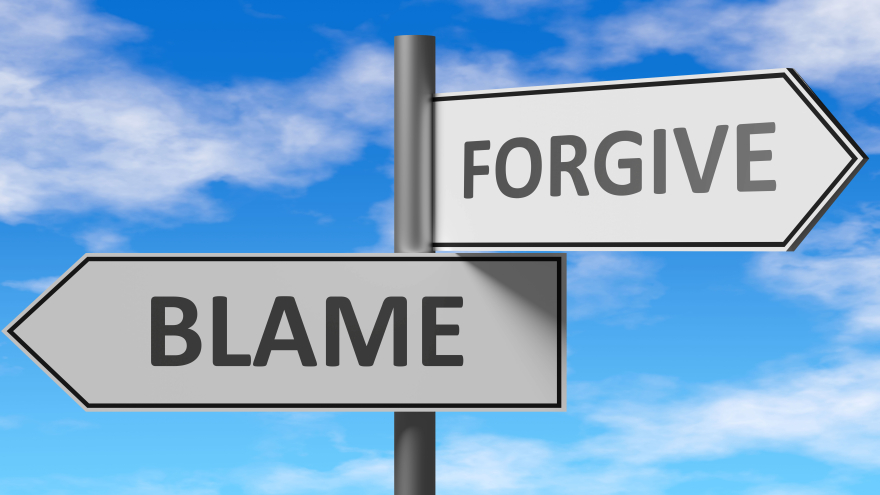PERSONAL NOTE
I was born in San Diego and have lived here my whole life. It's beautiful, lots to do, and great weather so there has never been a good reason to move. When I was younger, I spent a lot of time at the beach, in the sun and water and we didn't have sunscreen back then. So, with that in mind, the other day I had a small skin cancer spot removed from my forehead. The doctor was challenged trying to finish the process and the funny part is that now my right eyebrow is a 1/2 inch higher than my left brow. Not sure if they will ever match again so 20 years from now if I am still wearing bangs you will know why.
ARTICLE

The Road to Forgiveness is a Journey Toward Freedom
“If unresolved anger is a toxin to the spirit, forgiveness is the antidote,” wrote Brian Luke Seaward in his book, Stand Like Mountain, Flow Like Water: Reflections on Stress and Human Spirituality.
When people get hurt, they often react with resentment, anger, rage, and even hatred. While some of these feelings may be appropriate responses, holding on to them can cause emotional pain and stress. Nurturing old wounds and resentments is like helping weeds to grow in a garden. The more care you give them, the more they take over until there’s no room for the feelings that can nourish you.
Forgiveness doesn’t mean condoning inappropriate behavior and excusing personal violations. It doesn’t mean giving up or hiding or denying what was done. To forgive someone for something doesn’t necessarily mean turning the other cheek so that you can be hurt again. To forgive doesn’t mean you forget that you were harmed. Or that you felt the way you did as a result.
What it does mean is letting go of the feelings of anger or resentment, so that you can get on with your life. Forgiving is a process—sometimes slow—that heals wounds and returns your power to you. So long as you hold onto old feelings, you give control of your life over to those who have hurt you. Forgiveness sets you free.
Ways to Forgive
It’s not as though you can simply decide to forgive someone, and it is done. Forgiving is an active process. To get from here to there is a journey to be traveled. But you don’t have to take it alone. Don’t be afraid to ask for help along the way.
-
Acknowledge all the feelings. Though anger and resentment might be on top, beneath may lie feelings of hurt, betrayal, loss, and grief. Uncovering these more tender emotions may be painful, but, like curves in the road, it is part of the journey to be traveled.
-
Stop blaming. So long as you hold someone else responsible for your feelings or circumstances, you don’t own your own life. You stop blaming by accepting total responsibility for your life, which starts with how you handle yourself today and every day after.
-
Release the desire for revenge. The wish to inflict suffering or pain on the person who hurt you keeps you in a place of suffering and pain. You cannot experience the freedom of forgiveness until you are willing to move away from the need to punish.
-
Learn to accept. It’s virtually impossible to stop judging; however, the fewer negative judgments you make, the easier it is to accept. And, according to author Dr. Wayne Dyer, “Acceptance is forgiveness in action.” Think of how useless negative judgments are: does it affect the weather because you say it’s awful? Imagine complaining to God about the quality of a sunset. Making judgments says very little about what is being judged but communicates a lot about the one who is doing the judging.
-
Decide to confront or not. Talking with the person who has harmed you may or may not be the best action to take. Professional counseling can help you in making this decision.
-
Let go. Forgiveness can only be unconditional by releasing all feelings of anger, resentment, or hatred. “Sweet forgiveness cannot hold any taste of bitterness,” says Brian Luke Seaward. “When feelings of anger are released, the spirit once held captive by the encumbrance of anger is free to journey again.”
Self-forgiveness
Forgiveness is not just an outward expression toward others. Turning the open hand of forgiveness inward is one of the greatest gifts you can give yourself. When you forgive yourself, you acknowledge your human limitations, release yourself from your own judgments, and practice self-acceptance. These actions are essential for a life of freedom and joy.
You may harm yourself or others through action or inaction, out of fear, pain, or confusion. But when you say, “I’ll never forgive myself,” you sentence yourself to a life of guilt and shame.
Practice self-forgiveness through:
accepting yourself rather than judging yourself
honoring yourself rather than blaming yourself
nurturing yourself rather than criticizing yourself
releasing the past rather than holding onto it
Forgiveness, even self-forgiveness cannot be forced. And it may not come easily. Like many other skills you must learn, self-forgiveness takes practice. If you are unable to immediately release the past and move on, be forgiving of yourself and continue the practice.
POWERFUL QUOTE
Forgiveness is a strange thing. It can sometimes be easier to forgive our enemies than our friends. It can be hardest of all to forgive people we love. ---Fred Rogers
UPCOMING EVENTS
Look for me at the CEA Annual conference in Los Angeles in October. If you will be attending let's get together to share a glass of wine and celebrate in person meetings again.
CONNECT WITH ME
Linked In
Please let me know if there are particular items you would like me to cover in upcoming newsletters. Just email me at jancerasaro@yccbe.com
Stay safe, healthy, and happy!
Coach Jan
|